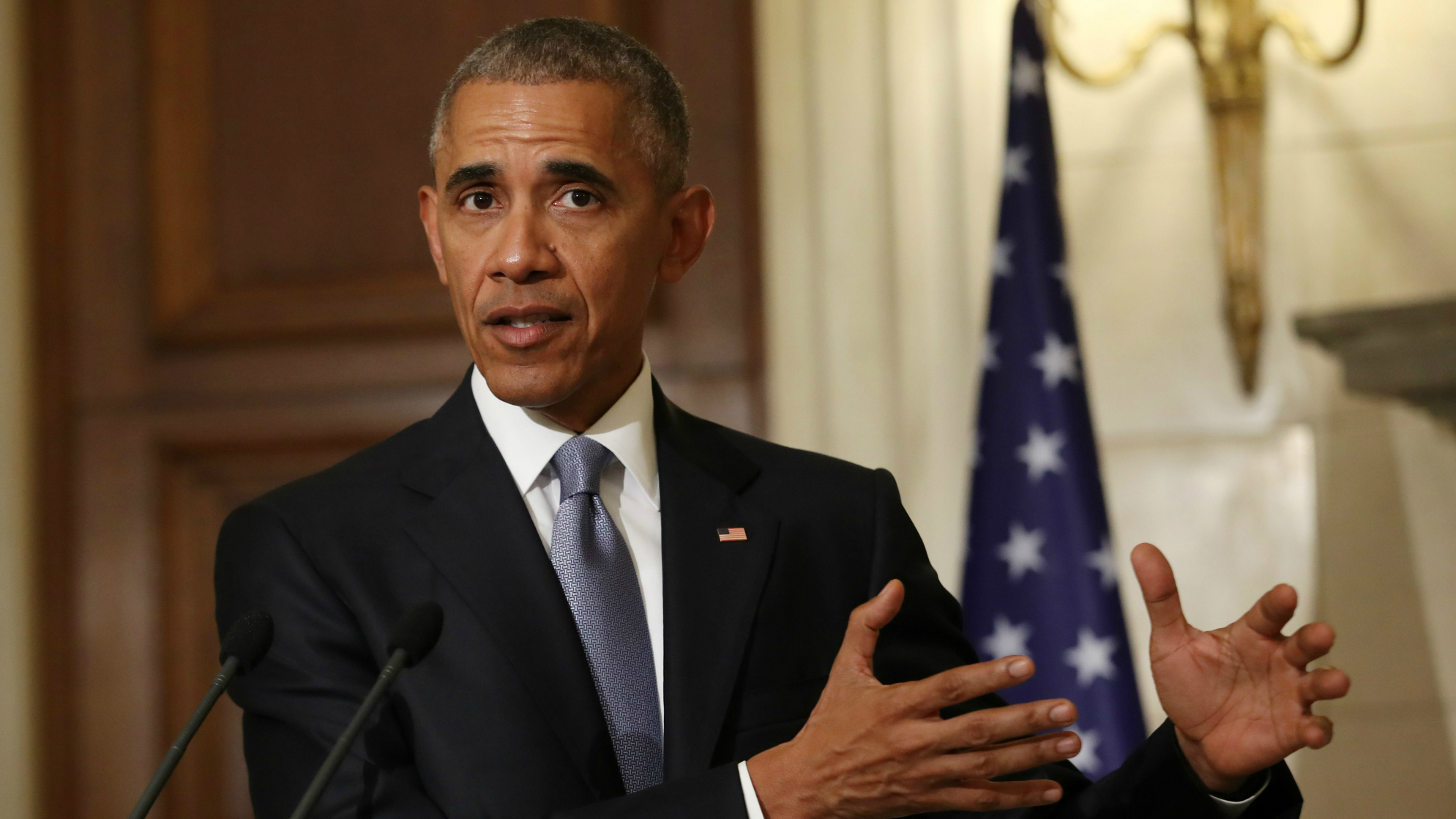Is your hashtag activism actually helping anyone?
With Barack Obama questioning woke culture and hashtag activism - is he out of touch or do we all need to get offline to make a real difference in the world?


Celebrity news, beauty, fashion advice, and fascinating features, delivered straight to your inbox!
You are now subscribed
Your newsletter sign-up was successful
With Barack Obama questioning woke culture and hashtag activism - is he out of touch or do we all need to get offline to make a real difference in the world?
Words by Clare Thorp
From shattering our attention spans and self esteem to being a hotbed for abuse and even influencing elections, social media doesn’t always have the greatest reputation. And it recently came under more criticism from everyone’s favourite former President, Barack Obama.
In an interview about youth activism at the Obama Foundation Summit in Chicago, Obama called-out call-out culture, specifically the practice of ‘cancelling’ someone online when they’ve said or done something that you object to. He spoke of what he saw as a ‘worrying trend’ among young people. ‘There is this sense sometimes of: ‘The way of me making change is to be as judgmental as possible about other people,’’he said, ‘and that’s enough.’ ‘Like, if I tweet or hashtag about how you didn’t do something right or used the wrong verb then I can sit back and feel pretty good about myself, cause, ‘Man, you see how woke I was, I called you out.’’‘That’s not activism, that’s not bringing about change.’
His comments struck a chord with many, going viral and getting praise across the political spectrum. And yet, perhaps ironically, pockets of the internet were also quick to call-out Obama’s views, defending the right to be vocal about things they care about online — and saying that, contrary to what Obama says, speaking up on social media can be a first step towards effective activism.

Either way, it sparked conversation on just how much change you can achieve from behind your keyboard. While huge social movements like #MeToo and #BlackLivesMatter began life on Twitter, there’s also debate on how much good ‘hashtag activism’ really does. Are we confusing online outrage for activism, or can the internet actually wield power?
‘I believe that social media is a huge part of activism,’ says Hayley Smith, founder of Flow Aid, a campaign set up in 2015 to provide free sanitary products to homeless women. ‘Social media launched some of the biggest activist campaigns, and it launched FlowAid. It allowed us to make connections that I don’t think would have been established offline. However, while I do believe online campaigning is fundamental, it needs to be combined with coming offline to really make a difference.’
Celebrity news, beauty, fashion advice, and fascinating features, delivered straight to your inbox!
Since setting up the campaign she has done a TEDx talk, partnered with homeless charity St Mungo’s and now sits on a government task force tackling period poverty. ‘I have achieved much more offline than online. However, I would not have been able to do this without implementing a social media activism strategy initially.’
Social media certainly allows us to make a noise about issues we care about, and that can feel empowering. It’s also comforting to know there are others out there who care about the same causes, and have the same frustrations. And it can allow us to speak directly to people in power — even if they do ignore our tweets.
‘Social media has levelled the playing field when it comes to activism,’ says Ella Robertson, Managing Director of One Young World and co-author of How To Make A Difference. ‘You can very much can be a David and suddenly throw the teeniest tweetstone at a Goliath and make an impact. It's a weapon that allows you to contact and potentially talk to powerful people.’
However, Robertson says we also need to be aware of its limitations. ‘Activism has to go beyond hashtags to make a real difference. While that raises the general level of public consciousness of issues and creates a sense of caring and solidarity, the danger is that people think they've done something important and can become complacent and feel a false sense of accomplishment.’
She says that those serious about activism need to realise that online activism needs an offline counterpart. ‘If you're asking people to do something online, what is it that you're then pressing them to do offline? And are you asking for them to volunteer, are you asking them to give time? Are you asking to write to an MP?’
If you want to make a real difference, it’s about thinking what the next step might be, not just hitting the retweet button and thinking your work is done. Besides, if you’re feeling a sense of despair, spending too much time online might be making that worse. ‘Sometimes the internet is what is making us feel down and depressed about the world,’ says Robertson. ‘So put down your phone or laptop and get outside your front door.’
Activism: it's time to use more than your thumbs
Niamh McCollum finds five practical ways to give back right now...
1. Get out into your community
As the saying goes, charity begins at home - so check out the volunteering opportunities in your local area. Befriending is a wonderful way to start, as it offers the opportunity for you to be paired up with a member of your community who may feel lonely or isolated. Simply meet up for an hour once a week at their house or over a coffee, and lend a friendly ear to their worries of the day. Visit VInspired or Do-It to find out more about befriending opportunities in your area.
2. Find your people
If one-on-one volunteering isn't your thing, then group volunteering serves as the perfect alternative. Good Gym is a weekly running group that allows you to socialise, get fit and give back to the community all in one fell swoop. Available across the UK, its initiatives involve assisting vulnerable people with one-off practical tasks and helping local community organisations with projects such as tree planting or sorting out cans for food banks. The concept is simple: you meet your group at a pre-set starting point and run together to the volunteering destination. With each weekly session lasting between just 20-90 minutes, Good Gym is perfect for busy-bodies who are keen to double up as do-gooders.
3. Use your voice
Yes on social media, but also by writing to people in power. If you feel that you or other people in your area have been affected by a new government initiative, for example, then speak up and write a letter to your MP or start an online petition. Once a Change.org petition gains 10,000 signatures, the government is compelled to respond - so if you're passionate about an issue then it's worth actively fighting for it. Building up a targeted mass communication campaign is more likely to get attention and lead to positive change.
4. Don't forget our four-legged friends
Volunteering doesn't have to just benefit people, there are also plenty of ways we can give back to our furry counter-parts. There are tonnes of animal volunteering opportunities available throughout the UK, which you can check out on the RSPCA website. Such activities include dog walking, helping co-ordinate shelter re-homing schemes or even simply spending an hour of your time talking to a traumatised animal to help soothe them.
5. Perform an act of kindness into your daily life
In a time where we feel constantly under threat from political instability and climate catastrophe, it can be easy forget just how important the little moments of human interaction that make up our daily lives are - so always be kind. If you'd like some inspiration as to how you can brighten up someone's day, take a look at some options listed on randomactsofkindness.org. As anthropologist Margaret Mead infamously said, ‘Never doubt that a small group of thoughtful, committed citizens can change the world; indeed, it's the only thing that ever has.’
Niamh McCollum is Features Assistant at Marie Claire UK, and specialises in entertainment, female empowerment, mental health, social development and careers. Tackling both news and features, she's covered everything from the rise of feminist audio porn platforms to the latest campaigns protecting human rights.
Niamh has also contributed to our Women Who Win series by interviewing ridiculously inspiring females, including forensic scientist Ruth Morgan, Labour MP Stella Creasy and ITV’s former Home Affairs Editor Jennifer Nadel.
Niamh studied Law in Trinity College Dublin. It was after enrolling in a Law & Literature class on her year abroad in Toronto that her love of writing was reignited. In no particular order, her big likes are Caleb Followill, hoops, red wine, sea swimming, shakshuka and long train journeys.
